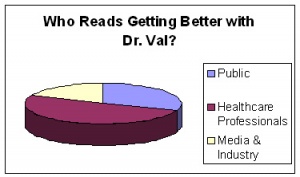November 17th, 2008 by Dr. Val Jones in Announcements
4 Comments »
I was a panelist at Edelman’s CHPA New Media Summit today in New Brunswick, NJ. Matthew Holt (of the Healthcare Blog and Health 2.0) was the keynote speaker, and I participated on a panel discussion with Dr. Roy Poses. It was exciting to meet Roy in person for the first time, as I’ve been following his policy blog for some time.
Matthew presented a very rosy picture of Health 2.0 (consumer-driven healthcare), more or less suggesting that it could provide a large part of the solution to our current healthcare crisis. I countered with a more cautious view, explaining that expert engagement would be critical to Health 2.0’s success.
Matthew argued that sites like Patients Like Me were enabling patients “to do their own clinical trials online,” and that this was opening a whole new avenue for research. Dr. Poses and I were fairly concerned about this suggestion, primarily because we understand how easy it is to draw false conclusions from data, especially when the data are not collected in a systematic fashion.
I explained to the audience that association does not prove causation (E.g. Do matches cause lung cancer? No, though it’s true that people who smoke are more likely to carry matches). I also described a case in which a Health 2.0 principle went terribly awry: a group of consumers were asked to rate their medications for efficacy by disease/condition. This was supposed to leverage the “wisdom of the crowds” to determine which medicines worked best (by popular vote). Of course, the result was that every pain syndrome (low back pain, headaches, fibromyalgia, etc.) resulted in a narcotic pain medicine as the highest ranked treatment option. Do you really need Oxycontin for that tension headache of yours? Obviously, narcotics are popular among users – but are a last resort for pain management in the real world. The “wisdom of crowds” rarely works in healthcare.
Matthew agreed to disagree with me on a number of issues – but we certainly found common ground on the primary care crisis. He and I both believe that a shortage of primary care physicians is going to result in a catastrophic shortage of care for Baby Boomers in the next decade. Dr. Poses added that primary care physicians make the same salary as school teachers in his home state of Rhode Island.
I think we have to agree with KevinMD – the way forward is not going to be pretty.
November 16th, 2008 by Dr. Val Jones in Announcements
No Comments »
I asked my blog readers to tell me who they were (poll results: n=145) and this is the breakdown:

I think that’s pretty interesting data – it seems that my blog appeals to doctors, nurses, allied health professionals, the general public and media/industry folks to boot. I was a little sad to see that pets were not as large a contingent as I had expected. I’ll need to work harder to reach that demographic, I suppose.
Gratuitous cat photo:

November 9th, 2008 by Dr. Val Jones in Audio, Expert Interviews
5 Comments »
I was following an interesting conversation on Twitter between several nurses. They were expressing concern about how nursing stereotypes were damaging to their profession. I invited them to discuss the subject with me via podcast.I have summarized some key points below.
You can listen to the whole conversation here.
[audio:http://blog.getbetterhealth.com/wp-content/uploads/2008/11/nursing.mp3]
Participants:
Gina from Code Blog (6 year veteran blogger, and has spent 11 years as an ICU nurse)
Strong One from My Strong Medicine (an anonymous blogger, athletic trainer and nurse of 3 years)
Terri Polick from Nurse Ratched’s Place (has held various positions in nursing, including psychiatric nursing for 20 years)
Current Nursing Challenges:
1. Nursing Instructor Shortage – nursing instructors make about 25% of the salary of nurses who do clinical work. Therefore, there are long wait times to enter nursing school due to instructor shortages. Many students can’t afford to wait, and choose other careers.
2. Inequality of Respect – some nurses feel that they have to continually prove themselves despite their training and qualifications. Patients often express disappointment or annoyance when they see a nurse practitioner (rather than a physician) in a group practice. Some doctors still expect nurses to give up their chairs when they enter the room.
3. Nursing Stereotypes – the “naughty nurse” and “nurse Ratched” images are still very much in the forefront of peoples minds when they think of nursing as a specialty. Some people believe that nurses simply pass out pills and make coffee, when in reality they are active in complex technical procedures and saving lives. These stereotypes and misconceptions denigrate the education and technical expertise of nurses.
4. Primary Care Doesn’t Pay: nurse practitioners incur higher debt and have lower salaries than specialist nurses. Just as in the medical profession, there are no incentives for nurses to choose careers in primary care.
Strengths of Nursing:
1. Nurses Are Better And Brighter Than Ever – since getting into nursing school is so competitive, the quality of individuals who are entering nursing school has never been higher.
2. Job Flexibility – nurses can easily transition to part time work for maternity purposes. Nursing careers offer a wide variety of work experiences – from nursing home work, to cardiothoracic surgery. One license offers hundreds of various opportunities.
3. Job Satisfaction – saving lives and serving patients contribute to a sense of job satisfaction.
What can be done to improve and advance the US nursing profession?
1. Establish an Office of the National Nurse. The National Nursing Network organization is promoting this initiative. The National Nurse would act as a government spokesperson for nurses- promoting preventive medicine, increasing awareness of nursing, and securing financial support for nurse education. He or she would be the chief nurse officer of the US public health service.
2. Do not be afraid to speak up. Nurses should feel comfortable defending their professional ideals, and discouraging stereotypes.
3. Blog to raise awareness of nursing challenges and successes.
**Listen to the podcast**
October 30th, 2008 by Dr. Val Jones in Announcements
1 Comment »
 Alright, well a little melodrama never hurt anyone did it? I’m trying really hard to listen to my readers and adjust my blogging themes/topics/approach accordingly. I actually have no idea what you like to read – health policy, touching stories, humor, research explained, expert interviews, celebrity health initiatives, health tips… etc. So I’m asking. What would you like me to blog about? Please vote in my poll on the right hand side of this page. (Or if you’re viewing this message in a reader, well please come on over to my blog and vote.)
Alright, well a little melodrama never hurt anyone did it? I’m trying really hard to listen to my readers and adjust my blogging themes/topics/approach accordingly. I actually have no idea what you like to read – health policy, touching stories, humor, research explained, expert interviews, celebrity health initiatives, health tips… etc. So I’m asking. What would you like me to blog about? Please vote in my poll on the right hand side of this page. (Or if you’re viewing this message in a reader, well please come on over to my blog and vote.)
So far (my poll has a N=11, not a very high statistical power) you readers seem to be saying that you like personal stories about the blogger (I guess that means you want me to tell you about my cat – well there she is, featured in the top left-hand corner. Her name is “Ona” and she has an insatiable appetite for grilled asparagus.)
But I have this sneaking suspicion that you don’t really want to hear about ME, you’d like to hear about healthcare and medicine from a fresh perspective. But maybe I’m wrong. Maybe this should be a cat blog? Please do vote in my poll so you can water down the voices of those crazy people who are asking for more personal blogging. If you don’t… my only choice is to give the people what they want… and you may be doomed to read about kitties, etc. forever!
***
Bizarre event of the day: I was voted as one the top 20 most influential health voices on Twitter. So go ahead and follow me there. My Twitter name is drval.
October 21st, 2008 by Dr. Val Jones in Announcements
1 Comment »
Dear friends of the blog – I’m going to San Francisco to the Health 2.0 conference, Oct 21-22 (I have to return to DC on the 23rd to attend the Cartoons & Cocktails event at the National Press Club. Some of my original artwork will be auctioned off for charity.)
Blogging may be light for 2-3 days, but stay tuned. And if you’re going to the Health 2.0 please stop by my booth. It’s #118.














